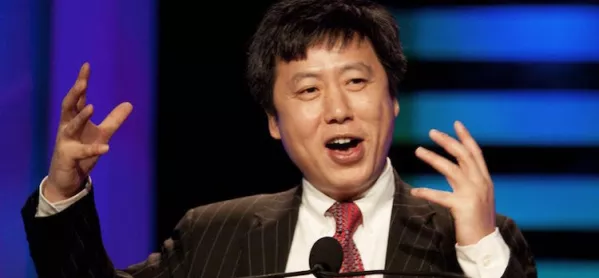English schools’ attempt to emulate maths mastery teaching from Shanghai is “fundamentally flawed” according to a leading international academic.
Professor Yong Zhao, professor in the school of education at the University of Kansas and a global chair at Bath University, told Tes that it was not possible to recreate school systems and teaching techniques outside of the culture and context in which they were developed.
He added: “Even if you could recreate all of the characteristics that you find in Shanghai today or in Singapore it would take 15 years to transfer this. And at the end, you would be left recreating what people were doing in Shanghai 15 years ago.
“Why would you want to turn to another country’s past to decide your future. That seems to me to be a stupid idea.”
Maths teaching in Shanghai has been held up as a system for the world to aspire to after topping international comparison tests run by Pisa.
In 2014, the UK government announced that 32 schools would act as new “maths hubs” responsible for ensuring English students reached the same level as their Eastern peers.
As part of this, the hub schools hosted Chinese teachers who ran masterclasses.
And two years later, schools standards minister Nick Gibb announced that the South Asian “mastery” approach to teaching maths was set to become a standard fixture in England’s primary schools.
The £41 million funding was aimed at ensuring 8,000 primary schools used the approach “used by some of the leading performers in maths in the world, including Shanghai, Singapore and Hong Kong.”
Prof Zhao said: “I was really shocked that the UK would look to do this because my research has looked at the side effects of Far Eastern approaches to maths.”
He said that policymakers need to not only assess how well an education programme works, but what side effects it may have.
In an article that he co-authored for Tes last month, he said: “A strategy that improves short-term mastery of materials can cause damages to creativity and transfer, for instance.
“In the case of Pisa, even if the factors that make an education system successful in achieving high test scores could be identified with precision, it is perfectly possible that they might hurt student wellbeing.
“East Asian education systems, for example, have been found to be very effective in producing excellent performances in tests and hurting students’ social-emotional, psychological, and physical wellbeing, resulting in less life satisfaction, less positive attitude, and lower levels of confidence.”
Prof Zhao told Tes that policymakers in England were turning to techniques from East Asia that were now being questioned in the countries they originated in.
This is highlighted in his new book What Works May Hurt: side effects in education, which urges policymakers to think about the unintended impact of education policy.
In this, Prof Zhao writes that students in East Asia are generally less happy than their peers in other parts of the world.
It says: “In 2017, the OECD released a report on students’ wellbeing in the more than 70 education systems that participated in the 2015 cycle of Pisa. According to the report, students in East Asian education systems are significantly less ‘satisfied with life’ than children in the West.”
He also highlights how East Asian students reported a significantly lower sense of belonging in schools. He says: “The Pisa report showed that in Macau, Hong Kong, China and Singapore, students were ranked the lowest in terms of a sense of belonging.”
Prof Zhao believes policymakers need to look at a broader range of outcomes when deciding whether to look to replicate an education programme from another part of the world.




